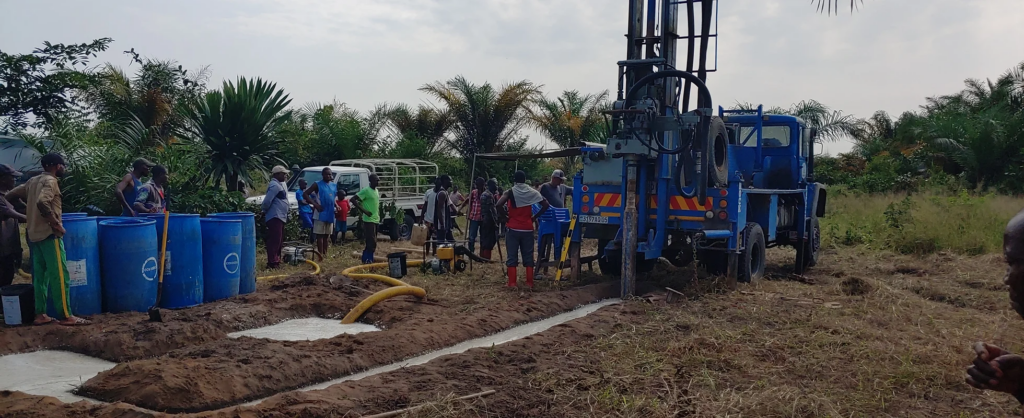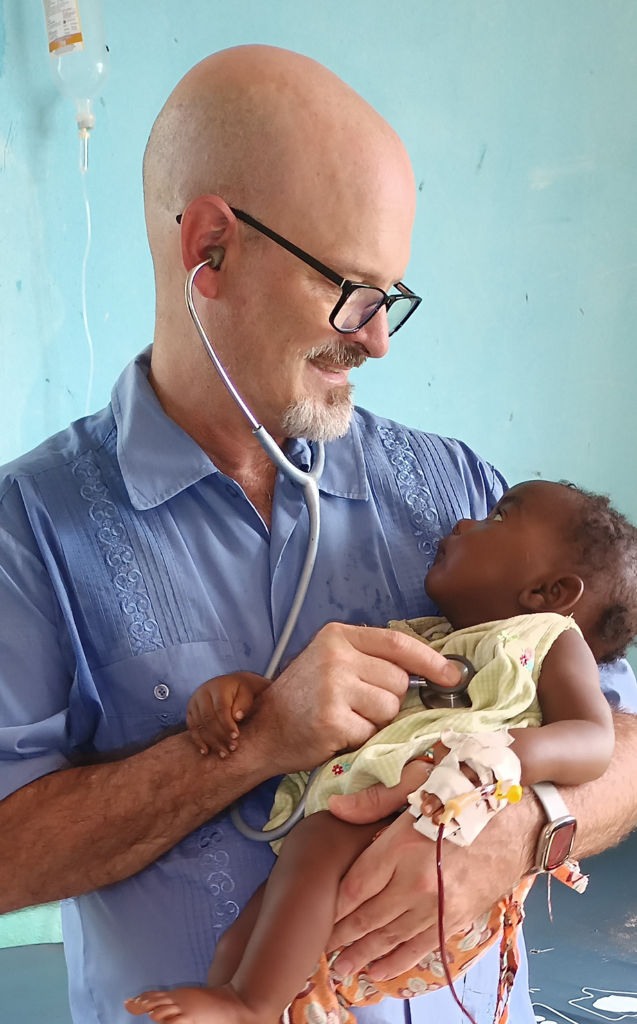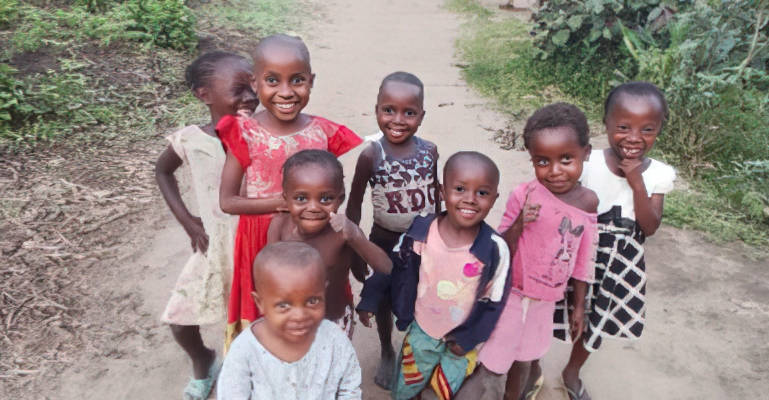by Harry Goldhagen, Editor

I first heard of Dr. Paul Law in an opinion article he penned about the measles vaccine in Stat News. He wrote, “Where I live, in one of the poorest places on earth, measles kills thousands of children a year.”
Where was this? Yes, measles is making a resurgence in the developed world, due to vaccine avoidance, but thousands of deaths?
Reading on, I learned that Dr. Law is chief of medical research for Sankuru Province in the Democratic Republic of Congo, or DRC. He is also the only pediatrician for around 1.5 million children and adolescents in this poorest region of a poor country. There are no paved roads. No paved airports. No municipal water or electricity. Around 15% of the children die by age 5.
I wondered what would prompt a well-educated physician, with three degrees from Johns Hopkins — an MD with a specialty in pediatrics, a masters degree in public health (MPH), and another masters degree in informatics — to work in such an underdeveloped place, where most villages can only be reached by foot or by the rare tiny motorcycle. Where hundreds of children died from measles during periodic measles epidemics.
I sent him an email and was surprised to receive a response almost immediately. Dr. Law was finishing a stint working in the US for a few months before returning to the DRC, so we arranged to speak the next day via zoom. This is what I learned.
All in the Family
The connection to Africa began with his grandfather, Burleigh, who grew up in Weirton, West Virginia, a steel mill town in the 1930s, according to Dr. Law. “He was stealing and cheating. He was an awful teenager. He got beat every day by his dad because he figured, well, he deserved it, if he didn’t have any reason.”
Then, in 1936, during high school, Burleigh “had an encounter with God.” He attended Asbury College (now, Asbury University) in Kentucky. According to Dr. Law, he flunked out of seminary because of his lack of motivation, but he was relieved to learn that his mechanical and engineering skills were useful for the Methodist mission in the Belgian Congo.
As the story goes, according to a memoir written by Burleigh’s wife, Alex Reed was going to give a talk at Asbury College, and Burleigh was supposed to pick him up in a borrowed car. (Alex Reed and his wife Hazel were famous missionaries to the Belgian Congo, where they worked for forty years, pioneering mission stations in remote areas and traveling over 200,000 miles on foot, bicycle, boat and, eventually, by car.)
Unfortunately, the borrowed Cadillac broke down. Burleigh immediately put on his overalls and got his toolbox, which he always carried with him. He quickly fixed the car, and they made it to the talk on time. Alex Reed said they needed people like him at the mission!
His grandfather’s biggest project in the Congo was to build a hospital, the Wembo-Nyama Hospital, Dr. Law explained. He also became pilot for the Wembo-Nyama Methodist mission.
In 1964, during a period of great unrest in the Congo, Burleigh was shot three times by rebel soldiers. He was brought to the hospital he built but died during surgery, “but not before he invited all to a pray with him for the Tetela people, his wife, his children and his unborn grandchildren. After forgiving the rebel soldiers, all his children returned to serve in Sankuru.” These were Burleigh’s three children: David (Dr. Law’s father), Paul (with the same name and birthday as Dr. Law, causing all sorts of confusion), and Margaret.

Dr. Law’s father spent his entire life in Sankuru, and his uncle Paul (age 76) and his wife are still there, drilling wells for villages. Even Dr. Law’s brother has projects in the region, introducing regenerative agriculture to replace environmentally destructive slash-and-burn farming.
Sankuru is therefore Dr. Law’s family home. He had planned to work there after earning his last degree in informatics — in fact, he earned these degrees specifically to return to his Congo home — but many humanitarian projects side-tracked him. He’s worked in Bangladesh, Egypt, and Ethiopia, to name a few. After his son was diagnosed with autism, he spent many years conducting research on this devastating disease.
Nevertheless, it has always been his desire to return to Sankuru. And in December of 2022, he did.
There’s No Place Like Home

One day in 2022, the Minister of Health invited Dr. Law back to the DRC. He didn’t know what to expect, but he was glad to return. Dr. Law previously worked with the health ministry, helping to build and install the current health information system used by the government, and training people in how to use it and how to analyze the data to make good health decisions.
The minister was in France by the time Dr. Law arrived, so he visited the Sankuru provincial headquarters, where he met with the provincial chief of the department of health, who oversees all the clinics and health centers in the province.
The chief of the department informed him he was now working for the Ministry of Health as the chief of medical research for the province and analyst for the health information bureau. Even though it is, in a sense, an honorary position — there is no salary accompanying the job — it is official, and a rare honor for a Westerner to be employed by the local government. He is the only pediatrician in Sankuru.
“This is where I love to be working,” Dr. Law said. “For me, I guess there’s a huge emotional need in me to be there and to be part of the solution.”
He is not yet able to practice as a clinician — or act as chief of pediatrics at Lodja General Hospital, the second largest hospital in Sankuru — until he qualifies for a Congolese medical degree, but he is rapidly finishing up the required paperwork to be certified. Nevertheless, he sees his role more in supervision and training than in direct clinical care. He also hopes to have a number of medical research projects going soon. His dream is to emulate the approach of Johns Hopkins, with its triangle of patient care, research, and education.
The Road Less Traveled

One of the challenges of managing health care in Sankuru is its profound lack of development. The province is the size of Ohio, with nearly three million people, and yet there are no paved roads. Many of the dirt roads wash out during the rainy season — the DRC is one of the rainiest places on Earth — so the only way to get from one place to another is by motorcycle or by foot. There are no paved airports. There is no municipal electricity and no running water, and almost no communication system.
Sankuru is so underdeveloped that when Dr. Law worked on a project in Bangladesh, his colleagues thought he was crazy. Why? Because all he could talk about was how developed Bangladesh was. For people coming from the US or Europe, Bangladesh is about as far from developed as one could get. But compared with Sankuru, it has a lot going for it. For instance, Bangladesh has paved roads! Ghana and Haiti have hundreds of miles of paved roads! While Sankuru has none.
You can say that Dr. Law is obsessed with usable roads, but for a very good reason. Roads are necessary for gathering information, and for providing care.
It is very challenging to get accurate medical information in Sankuru. It can take five days round trip to travel from one end of a health zone (equivalent to a county or district) to the other to gather the monthly health data. There are 16 health zones in the province, each facing similar difficulties.
This lack of roads also interferes with immunization. Dr. Law wants to immunize all the children in Sankuru against preventable diseases. But how can you do that when some vaccines require refrigeration and there’s no electricity and no cooler that can keep the vaccines viable for long trips on the washed out, rutted roads in the middle of the Congo?
I’ve Got Your Number

With so many challenges, it can be difficult to collect accurate medical information. Dr. Law helped deploy the current system, DHIS2, in use in the DRC, which works off of aggregated data, by village and by zone (or district). But he is in the process of designing an information system called ESTA that will gather detailed community household data.
He hopes it will help support disease surveillance, collection of vital statistics like births and deaths, vaccine use, and distribution of vitamin A and deworming medicine (mebendazole). With this new system, he will be able to tell which children did not receive their vaccines and will then direct the community health workers to get them immunized.
Eventually, Dr. Law hopes the ESTA system will play a role in equitable micro-lending programs, supporting regenerative agriculture, and monitoring water-borne diseases, which will inform the well-building projects of AMECO.
The challenge, of course, is gathering the data. Cell phones do work in some parts of Sankuru, although there can be difficulties. The health zone offices have access to either a cellular network or a satellite network, but most of the villages do not have cellular access. In some villages, Dr. Law said, you can get a cell phone signal, but only if you climb a certain tree and lean the right way. And one village set up a little bench inside a shaded structure — because that was the only place where the cell network worked!
(In a follow-up call with Dr. Law, now back in the DRC, he had to leave his home and stand in a specific part of town to get cell service. It was a surprisingly clear signal — better than many locations in rural Vermont, where I live — but we still had occasional drop-outs.)
One hope is that with some Starlink antennas and clever positioning of mobile networking equipment, there will be sufficient wifi connectivity to send and receive text messages from the community health workers. These systems will require line-of-sight installation, which might be a challenge. And if anything goes wrong with the equipment — a modem needs rebooting, someone trips over a cable and disconnects it, a part breaks — it may be very challenging to get a technician from Kinshasa out to a remote village.
A New Hope

Poor communication, missing infrastructure, and unpaved roads all have an impact on the health of the children of Sankuru. But one big issue is the lack of money. Dr. Law wrote, “Many children in the Sankuru province of Congo die because their parents cannot pay for their hospitalization — only about $150.”
To address this, he started a fund called First Hope, to raise money to cover basic hospital expenses. He wrote that a donation of $150 “covers all medications, hospital fees, blood transfusions and whatever else is needed.”
This is just one of the many ways Dr. Law hopes that he can help improve healthcare in Sankuru. He has big plans to build the ESTA system, ensuring that much needed preventative care is delivered to each and every child. He would like to see research conducted to improve how healthcare is delivered and made more accessible. And he hopes that like minded people will join him in his mission.
He prays that he can help the people of Sankuru during the next two decades. “That’s how much I’m asking God to give me,” he said. “Just give me 20 years and I can do a lot of good work here.”

C’est une histoire passionnante.